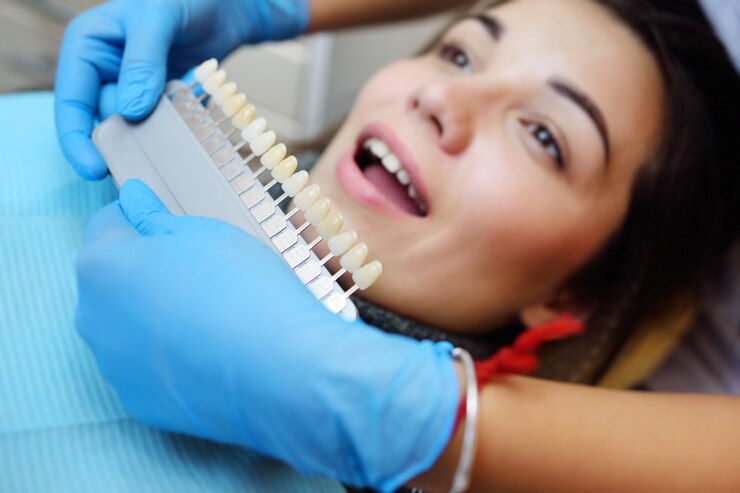When it comes to Oral Care for Children, baby (primary) teeth play a surprisingly critical role—far beyond just being placeholders. These small teeth are foundational links to your child’s lifelong dental well‑being. Understanding why they matter and how they shape future oral health is key to building healthy habits that last.
Why Baby Teeth Matter Beyond Temporary
Guiding Permanent Teeth
Baby teeth hold open space in the jaw and guide permanent teeth into the correct position. Losing baby teeth too soon can cause teeth next to them to move, which can make adult teeth crowded and out of place.
Support for Jaw and Facial Growth
They help shape the jaw and support facial structure and muscle development. The presence of healthy primary teeth influences how the jaw grows, helping to ensure that permanent teeth emerge with enough room and proper alignment.
Speech and Nutrition Development
Baby teeth are vital for clear speech. Sounds like “t,” “d,” and “s” require correct tooth placement and support. They are also essential for chewing, which aids digestion and good nutritional intake—undermining them can cause eating difficulties or nutritional shortfalls.
Long-Term Effects of Baby Tooth Decay
Impact on Permanent Teeth
Cavities or infections in baby teeth can disrupt the growth of underlying permanent teeth, causing weakened enamel, discoloration, or even deformation before adult teeth emerge.
Early Tooth Loss and Misalignment
Untreated decay may result in premature loss of primary teeth. Without these “placeholders,” spaces can close up, causing misalignment that often requires orthodontic correction later.
Early Childhood Caries (ECC)
ECC is a harmful dental condition in young children, caused by sugary diets, bacteria, and poor dental routines. It’s highly common, affects primary teeth, and can lead to pain, infection, and complications with adult teeth.
Best Practices in Oral Care for Children
To safeguard children’s smiles now and in the future, it’s essential to follow simple, effective steps that promote healthy habits and dental development.
Start Early — Even Before Teeth Appear
- Clean Gums from the Start
Clean your baby’s gums twice a day with a soft, damp cloth before any teeth come in. - Begin Brushing with First Tooth
When the first baby tooth comes in, use a soft-bristled toothbrush and a very small amount of fluoridated toothpaste (about the size of a cereal grain) and floss it twice a day.
Establish Healthy Daily Routines
- Regular Brushing Habits
Continue brushing two times a day and encourage flossing when teeth start touching. Supervise children until brushing is thorough. - Use Fluoride Appropriately
A small amount of fluoride toothpaste helps strengthen enamel and prevent decay. For children under age three, a smear is enough; for ages three to six, a pea‑size amount is recommended.
Smart Diet Choices and Habits
- Reduce Sugar Intake
Frequent sugary foods or drinks fuel harmful bacteria that cause decay. Avoid prolonged bottle‑feeding of juice or milk, especially at night. - Promote Nutritious Food and Drinks
Encourage wholesome, low‑sugar options that support healthy tooth development and digestion.
Make Early Dental Visits a Priority
- First Visit by Age 1
The American Academy of Pediatrics and dental professionals advise that children have their first dental check-up by the age of one, usually within six months of the first tooth appearing. - Regular Check-Ups
Consistent visits help monitor development, catch early decay, and establish a positive comfort with dental care.
Why All This Matters – The Long-Term Impact
- Prevent Pain and Infection
Healthy primary teeth reduce the risk of cavities, abscesses, and infections that can disrupt sleep, school, and everyday life. - Build Lasting Habits
A young child who learns to brush, floss, and choose healthy foods is more likely to carry those good oral care for children habits into adolescence and adulthood. - Enhance Confidence and Well‑Being
A healthy smile supports speech, nutrition, and self‑esteem. It can help children interact confidently at school and in social settings.
Laying the Foundation for Lifelong Smiles
Baby teeth are more than just temporary—they shape the future smile and oral health of your child. By practicing effective Oral Care for Children, starting early with cleaning, fluoride use, good nutrition, and dental visits, you lay the groundwork for healthier permanent teeth, better alignment, clear speech, and confident smiles.
Focusing on simple, consistent habits now will give your child the best teeth they could ever ask for tomorrow.


